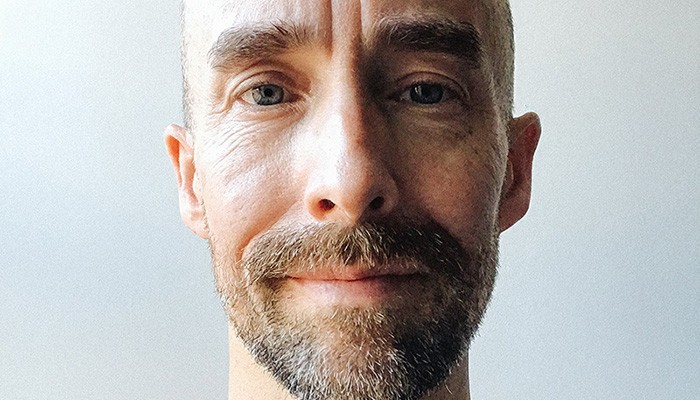MyInd Interview with Mat Mc Dermott on Hinduphobia, Vegetarianism and critical aspects of Sanatana Dharma
- In
- 10:42 AM, May 04, 2021
- Ramaharitha Pusarla
Mat Mc Dermott is Senior Director Communications, Hindu American Foundation
How did you get introduced to the Sanatana Dharma?
I first was introduced to Sanatana Dharma, though I didn’t know the name at the time, when I was a teenager in the early 1990s. Through the skateboarding and punk rock community that I was a part of met a number of people involved in ISKCON. It’s perhaps not well-known in India but at that time there was a sub-community of punk musicians who were devotees of Krishna. It was through this exposure I first adopted a vegetarian diet. A few years later I discovered the writings and teachings of Sivaya Subramuniyaswami, in the Saiva Siddhanta tradition. The Shaivite outlook immediately made sense to me and I dove right in, reading as much as I could, practicing asana and meditation, trying to apply the teachings in my own life.
What aspects endear you in Sanatana Dharma?
The sense that Sanatana Dharma has that everyone can access and experience Divinity for themselves; that you don’t have to do this in one right way, rather there are many paths; that it is based in personal practice, rather than simply belief; that you don’t and shouldn’t just believe what a spiritual teacher says, but should apply the teachings and experience the results yourself.
Hinduphobia which has long been dismissed as non-existent is now out in the open; how can this narrative be countered?
We have to consistently point out when Hinduphobic incidents happen or ideas are expressed. I find using comparisons with other religious traditions to be useful: Saying that if what was just said about Hinduism was said about Islam, or Judaism, or Christianity, how the ignorance or bigotry would likely be obvious to the listener, so why should such things be acceptable when said about Hinduism.
While Yoga is banned in Alabama schools, attempts elsewhere are in place to appropriate Yoga what is your take on this larger phenomenon?
My approach is, when I have a platform to do so, to highlight the roots of yoga, the breadth of the tradition and practice so that it can be put in its proper place. Unless shown clearly otherwise, my starting place is to assume that the person is acting out of ignorance rather than malice or anti-Hindu sentiment.
Among the various Indic practices, worship of nature and vegetarianism have been great attributes of Sanatana Dharma. While the World battles with climate change repercussions, how important is it to highlight these vital aspects for sustainable living?
It’s critically important to highlight the positive affect that vegetarianism can have in reducing the effects of climate change and other environmental issues — especially since it’s something every single person can easily do, unlike some of the bigger systemic changes needed, like reducing use of fossil fuels or changing our economic systems to take into account the ecological damages. Worship of nature isn’t something I specifically often mention, as such. Rather I tend to emphasize that everyone can cultivate a deeper connection with nature. When you have this personal connection, the desire to preserve nature becomes second nature, pardon the pun.
India has been a treasure trove of various knowledge systems; the beneficial aspects of Ayurveda can be of immense value especially during the times of global health emergency. As a part of the communication team at Hindu American Foundation, how do you think can these aspects be put to greater use in global context?
In the context of the pandemic, the aspect of Ayurveda that should be emphasized is its benefit in building a foundation of good health and nutrition broadly speaking — rather than any attempt to say that x part of Ayurveda is going to prevent you from getting COVID or transmitting the virus. Ayurveda can most certainly help you build a well-functioning immune system, help you eat well, build a good foundation of health, and can help you manage symptoms.
Despite the huge influence Indian Diaspora wields, why are they incapable of driving the Indian soft power?
Is the Indian diaspora incapable of being a driver of Indian soft power? I’m not sure that’s the case.
What do you think should be the broader strategy to address the bad-mouthing of India and Indic practices?
The approach needs to be direct but polite rather than aggressively confrontational, provided that the bad-mouthing is done out of ignorance rather than confirmed malice. We need to communicate in ways that help make the listener more receptive to the message, rather than reinforce the perception we are trying to counter or can be turned around against us — the opposite happens too often. The approach also needs to be long-term. Much of the negativity and stereotyping of India and Indic practices has been around for a long, long time, being rooted often in colonial mis-interpretations or bias. Changing deep-seated perceptions can take a long time, in many cases.
Why is a dichotomy of Hinduism and Sanatana Dharma rampant even though they are one and the same?
Is there a dichotomy? At least in the United States, outside of the Indian diaspora and some academic circles, if you use the phrase ’Santana Dharma’ no one knows what you’re talking about. That’s why, unless I know the person, I’m speaking with will know the phrase, I always use Hindu. I try to meet people where they are in terms of their knowledge. If I say I’m Hindu or a certain practice or belief is Hindu, nearly everyone will have at least some idea of what I’m talking about (even if their knowledge is limited or incorrect). But if I say the same thing is part of Santana Dharma, I have one more hurdle in communicating with them, since the phrase often doesn’t evoke something in their mind.
Image Source: Twitter







Comments